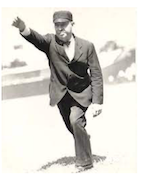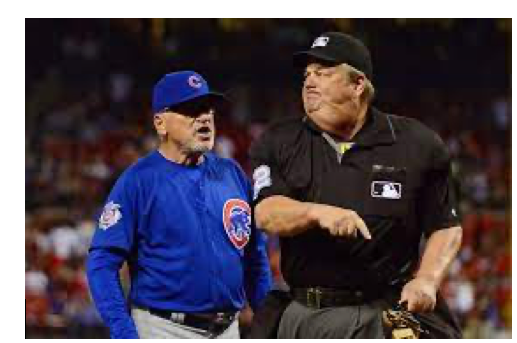Blue Cowboy
Hats off to Joe West, who recently broke the major league record for games umpired (5,376) that was set by Hall of Famer Bill Klem. “The Old Arbiter” umped in the National League from 1905 until 1941, while the “Blue Cowboy” started out in the NL in 1976, which means his MLB career is now 45 years long, six more than Klem. Who’s to say who was better, though at least one man could’ve—Danny Murtaugh, who played for the Phillies in ’41 and managed the Pirates in ’76. Unfortunately, Danny passed away before he could tell us, in December of ’76.
One thing is for certain. It’s an incredible milestone that gets more so the more you think about it. That’s around 50,000 innings, not counting exhibition games, come the hell of July and August or the occasional high water. There’s the verbal abuse that every umpire takes, and the physical abuse from all the foul tips, the constant bending, the hustling to be in position. Then there’s the mental pressure of having to be right all the time in front of multiple audiences—on the field and in the dugout, in the press box and the stands, watching from home and listening on the car radio.
So you can hardly blame umpires for getting testy at times, and a short fuse is a trait shared by Klem and West. Klem gave the thumb to players or managers who crossed him 251 times. West is at 193 and counting. If he starts throwing general managers out of the game, as he did Mike Rizzo of the Nationals last year, he might have a chance to catch “Catfish”—which is what Klem was called behind his back because 1) he looked like a fish and 2) if he heard you say it, you would be gone.
Klem and West toss men like baseballs
Though Klem was diminutive, and West is portly, they had much in common. Both traded in the “tools of ignorance”, i.e. catching, for the tools of omnipotence, i.e. umpiring. Both had a lot to do with refining those tools. Klem, who was born William Klimm in Rochester, N.Y. in 1874, popularized the use of the inside chest protector, and West patented the West Vest for Wilson Sporting Goods. Both of them appeared in motion pictures—Klem in the 1951 documentary Horsehide Heroes along with 28 other Hall of Famers, as well as Thomas Edison; West in The Naked Gun: From The Files of Police Squad (1988) alongside one of our finest actors, Leslie Nielsen, not to mention Reggie Jackson, Jim Palmer, Dick Vitale and, um, O.J. Simpson.
Joe makes his acting debut at the end of this clip:
Though some might argue, they also had to be good to have lasted that long. Who had it tougher? For most of his career, Klem was part of a two-man crew, and he was calling balls and strikes most of the time—his 3,544 games behind home plate is a record that will never be broken.
On the other hand, Klem’s games averaged about two hours in length. When West started, the average length of game was 2:29, but by 2000, the time was up to 3:00 and now stands at 3:08. Klem also never faced the second-guessing that comes with television, slow-motion replays and the constant supervision from MLB’s umpire bureaucracy.
When Joe broke the record on Tuesday night, May 25, I had to smile. You see, a long time ago, I wrote about Joe for Sports Illustrated, and it was not exactly complimentary. In a 1984 article entitled “The Umpires Strike Back,” I described an incident in which Braves manager Joe Torre, who was upset that West had ejected Bob Watson for throwing his bat after a called third strike that ended the game, confronted West, who pushed him and raised an arm. The National League fined them both and suspended West for three days—the first such suspension of a league umpire in 44 years. Said Torre, “He goes out of his way to look for trouble. He always does. It’s a shame because he’s a pretty good umpire.”
(Torre, by the way, is now a special assistant to baseball commissioner Rob Manfred, and as part of his responsibilities, he oversees the umpires.)
I wrote of West, “his deportment doesn’t match his technical skill,” then quoted him admitting, “The supervisors in every league I’ve ever worked have discussed my temperament with me… they think I’ll grow out of that, and I do, too.”
Six years later, I wrote about Joe again in a piece headlined (not by me, I swear to God), “Yer-r-r-r-r Out Of Line!” There had been another slew of umpire incidents, and Joe’s was a doozie. The Pirates were in San Diego in April when West directed that the lights be turned on in the top of the 7th with Pittsburgh batting. But because they were vapor lights, which require time to warm up, they didn’t actually go on until the Pirates had finished hitting. So he then directed that the lights be turned off because he didn’t want the Padres to have an unfair advantage in the bottom of the 7th. Unfortunately, the stadium supervisor could not be found, so West ended up yelling at Padres PR man Mike Swanson over the phone. As one Padre coach put it, “I don’t know why it is, but it seems we always have a fight with Joe West whenever he’s doing our games.”
If you had bet me in 1990 that Joe West would still be umpiring in 2021, much less breaking Bill Klem’s record, I would gladly have taken the under.
That’s not to say I didn’t like Joe. To the contrary, I enjoyed talking to him because he was friendly and gregarious and honest. And he had a great back story. A native of Greenville, N.C., he was a quarterback at Elon College, where he set three passing records. While moonlighting as a high school umpire, he came to the attention of the Carolina League umpire supervisor, who recommended he go to umpire school, where he graduated No. 1 in his class. His ascension through the ranks was so rapid that when he worked his first National League game in 1976, he was only 23.
He also had a love, if not exactly a talent, for country music. His first album, Blue Cowboy, was released in 1987, and one critic wrote, “Listening to the first excerpt… made me balk—you’ll pardon the expression—at listening to the second.” But the Cowboy kept at it, appearing at the Grand Old Opry and making friends with Merle Haggard, Mickey Gilley and Boxcar Willie. He even recorded a second album, Diamond Dreams, in 2008.
He has persevered, through a myriad of controversial calls, a mass resignation of umpires in ’99, several player polls that reflect his unpopularity, a bout with cancer of the larynx. Here’s a clip from 2020 that shows you just how resilient he is:
He has also defied the conventional wisdom that an umpire is doing a good job if you don’t notice him. Sometimes it seems that Joe lives to be noticed. Last year he made headlines when he told Ken Rosenthal of The Athletic that he wasn’t afraid of working during the pandemic because “I don’t believe in my heart that all these deaths have been from coronavirus.”
The year before that, he sued former catcher Paul Lo Duca for defamation of character because Lo Duca told an apocryphal story on his podcast about Joe widening the strike zone for reliever Billy Wagner because he let the ump drive his ’57 Chevy. West claimed that the story was a total fabrication and that it would hurt his chances of making the Hall of Fame.
But guess what? This past April, the judge agreed with West, and Lo Duca was forced to pay the man $500,000. (West was wrong, however, about the COVID-19 death toll.)
When Joe stepped on the field on May 25 for the game that put him in the record books, the fans at Guaranteed Rate Field greeted him not with cheers, but rousing boos. But he also had plenty of supporters. Commissioner Rob Manfred and former Commissioner Peter Ueberroth had greeted him in the umpires’ room, as had White Sox owner Jerry Reinsdorf. In the stands were friends like quarterback Jim McMahon, former NBA center Mark Eaton and 14-time Grammy winner Emmylou Harris. His longtime buds, The Oak Ridge Boys, sang the National Anthem, and a video tribute to Joe was shown. The original San Diego Chicken, Ted Giannoulas, came out to give him flowers… not.
Fowl Play.
Wait. Emmylou Harris is a friend of Joe West? I know he loves country music, and she’s a big baseball fan, but has she ever actually heard him sing?
Oh, well. If Joe is okay with Emmylou, I’m okay with him. Congratulations, Cowboy. As Emmylou sometimes sings, and Neil Young wrote, “Long May You Run.”
But please, let her do the singing when you get to Cooperstown.
-30-


